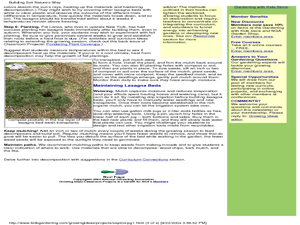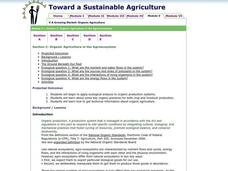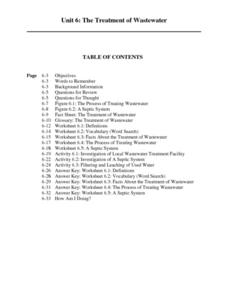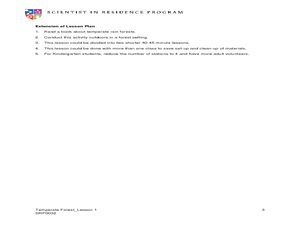Baylor College
Needs of Plants
What better way to learn about plant life than by creating a class garden? Young botanists start with a brief discussion about radishes before planting seeds and watching them grow. To determine the importance of water,...
CCEA
Home Economics: Teen Building
Learners explore the emotional and nutritional needs of teenagers in a six-lesson unit, which covers such topics as food sources, cooking skills, emotional well-being, and the positive effect of food and family occasions.
Curated OER
Exploring Ecology
Students explore the basics of ecology. They discuss ecological succession, the water cycle and human impacts on the environment. Students explore the owls, succession, the human impact on the environment and complete the "Incredible...
Curated OER
The Marvels of Mud
Young scientists roll up their sleeves and get a little dirty in this three-day earth science investigation. Following the scientific method, children monitor the growth of algae in pond water samples in order to determine...
Curated OER
Rosa Parks Community Garden
Pupils explore gardening and nutrition in the Rosa Parks Community Garden. They work in stations to discuss food choices, the life cycles of plants, and mini-composting. After starting in one station, they rotate to try each activity.
Curated OER
Going Global
Students describe the importance of aquaculture as a source for protein intake by humans globally. They are given a number from 1-3 as they enter the class. All "1's" recieve 10 beans. All "2's" recieve 5 beans. All "3's" recieve 1 bean....
Curated OER
Biochemical Cycles: Recycling Carbon and Nitrogen
Students construct flow diagrams of the carbon and nitrogen cycle processes. They identify sequences in each cycle that are affected by human impact and present their research to the class.
Curated OER
Plant Cycles
Students identify plants parts and their functions. In this plant cycle instructional activity, students examine parts of plants and how the parts help them survive in its environment. Students use graphic organizers, the internet,...
University of Southern California
Mastering Microbes
Small but mighty! Learners explore the role of microbes in a healthy ecosystem. An engaging lesson asks pupils to design an aquaponics system that demonstrates that healthy microbes are necessary to maintain the ecosystem.
Curated OER
Mr. Potato
Students identify the nutrients found in potatoes and the process of growing a potato plant. They role-play the potato life cycle, view a flannel board story, plant grass seeds in potatoes, and play hot potato.
Nuffield Foundation
Nitrogen-Fixing Bacteria in Root Nodules of Leguminous Plants
Fixin' to add a great resource to your plans? Scholars perform an experiment to investigate nitrogen-fixing bacteria from plant roots. Along the way, they learn about the concepts of symbiosis and mutualism.
Curated OER
Commonalities and Differences from Africa to Cleveland as Evidence Through the Gullah Community Connection
Students explore Afro-American history. They identify the commonality between African, Carolinian and Cleveland Black culture. Students explore the water cycle, oceanography, hydrology and bio-geochemical processes. They discuss the...
Curated OER
Family Life Cycle - Children's Lab
Students review how their nutritional needs change over time. In groups, they design their own menu in which they get all the nutrients they need. To end the lesson plan, they share their foods with the class and complete a wordsearch...
Curated OER
Building Soil Nature's Way: Exploring decomposition and soil health
Learners explore decomposition and soil health by creating their own garden. For this agriculture lesson, students build a "lasagna garden" with organic matter found in the area and plant perennials native to their region....
Curated OER
Water Filtration
As an example of nature's water filtering system, young ecologists conduct an experiment in the lab. They construct a funnel out of a plastic bottle, fill it with specified layers of materials that simulate layers of soil, then run muddy...
Curated OER
Nitrogen Fixation, OR What a Gas!
Students illustrate the adaptation and co-evolution of organisms. They examine set up an experiment to determine the effect of adding the Rhizobium bacteria to a group of legume seeds.
NOAA
The Dead Zone
The fifth installment of a 23-part NOAA Enrichment in Marine sciences and Oceanography (NEMO) program defines dead zones and how they form. Pupils then examine data from the Gulf of Mexico to determine dead zone formation.
Curated OER
Food Web Mobile
Students explain the main concepts of food webs and food chains. They
describe the role of animals, plants, and other organisms in cycling energy and matter through a food web by creating mobiles. Lesson contains adaptations for all levels.
Curated OER
Toward a Sustainable Agriculture
Students analyze organic production systems. In this organic agriculture lesson, students examine key organic practices for both crop and livestock. This lesson includes 5 different activities, 4 critical thinking questions and...
Curated OER
The Treatment of Wastewater
Students, through a series of lessons, study the various processes of treating wastewater. They participate in discussion and complete various worksheets and a hands-on activity, in which they observe the processes of filtration and...
Curated OER
Exploring Forest Objects
Students explore the forest. In this ecosystems lesson, students rotate through sensory activity centers, brainstorm, and read about temperate forests.
National Park Service
Reduce Our Carbon Footprint, Let’s Compost!
Roll up your sleeves and get a little dirty with this elementary and middle school compost lesson. All you need is a large plastic container, a couple old newspapers, some organic waste, and a few hundred worms and you're ready...
Curated OER
Toward a Sustainable Agriculture
Pupils examine how to use ecological analysis to animal production systems. In this sustainable agriculture lesson students examine where the nutrients flow in a system and complete several activities.
Curated OER
Fossil Fuels, Who Needs Them
Ninth graders explore how electricity is created and distributed through alternative production methods. Students participate in hands-on activities, research, lecture based instruction, and CD ROM resources.























